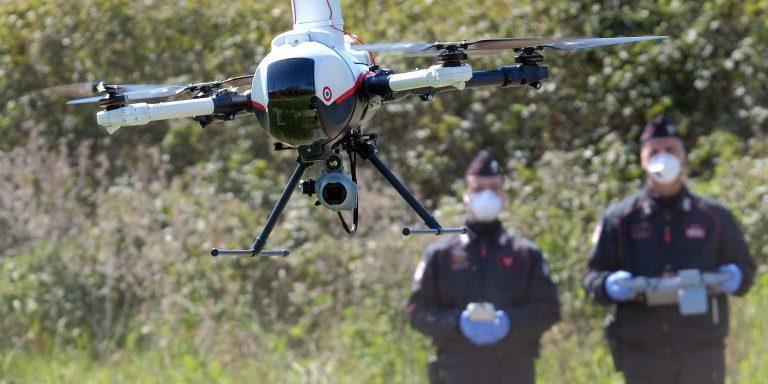INTELBRIEF
May 8, 2020
IntelBrief: Will COVID-19 Usher in the Era of the Surveillance Industrial Complex?

- In order to curb the spread of the coronavirus (COVID-19), countries around the world have been moving to implement new technologies capable of monitoring and surveilling their citizens.
- Even as citizens are willing to trade privacy for a promise of increased security, technologies being offered as temporary could very well become a permanent feature of everyday life.
- There are serious concerns about how governments are gathering, storing, and using the information they collect about everyday citizens.
- In a post-COVID-19 world, companies and countries may be even less concerned about human rights violations, and more focused on securing the technology they deem necessary to maximize data collection and provide them with a necessary edge over their competitors and adversaries, respectively.
In order to curb the spread of the coronavirus (COVID-19), countries around the world have been moving to implement new technologies capable of monitoring and surveilling their citizens. South Korea, Israel, and Singapore have each used location data, video camera footage, and credit card information to monitor their citizens, respectively, as part of a coronavirus tracking program. Yet even as citizens are willing to trade privacy for a promise of increased security, technologies being offered as temporary could very well become a permanent feature of everyday life. The result could be something of a surveillance industrial complex, akin to the military industrial complex, in which private sector technology firms design and supply governments, corporations, and even individuals with cutting-edge surveillance tools and equipment.
The endgame could be a self-perpetuating cycle that is rarely, if ever, questioned or undone, and likely to become an institution onto itself. Many would argue that this scenario is less about the future and in many parts of the world, has already become a reality of everyday life. Just by carrying a smartphone, people emit data on a voluntary basis that often includes personally identifiable information (PII). Such information, as well as additional data collected from smartphones and other devices, can be easily accessed by unscrupulous actors through a range of invasive hacking tools and other malware. Concepts like the Internet of Things (IoT) and a move toward so-called ‘smart cities’ can make everyday life more convenient, but there are also inherent vulnerabilities that put sensitive data at risk. There are serious concerns about how governments are gathering, storing, and using the information they collect about everyday citizens, and how companies share the data they collect with governments. Countries are collecting data not only on their own citizens, but on anyone that enters their borders, as data is emerging as the new currency of geopolitics.
Authoritarian countries have implemented new technologies to monitor the movements of their citizens. Using artificial intelligence (AI), biometrics and a range of other high-tech gadgetry, China’s internal security apparatus closely surveils various segments of its domestic population. China has a specific focus on surveilling its ethnic Uighur population, as well as Kazakhs and other Muslim minorities, in Xinjiang province in the country’s northwest. More than one million Uighurs are being held in detention camps. China already has over 200 million surveillance cameras and plans to use AI to help track the movements of its population, as well as to monitor the internet usage, travel, and personal communications of its citizens. And while this is clearly a trend happening in authoritarian countries like China, it could easily become commonplace in democracies and non-democracies alike. Through sales from Huawei, China has essentially blanketed large swaths of Central Asia with invasive technology. In Tashkent, the capital of Uzbekistan, there are nearly 1,000 surveillance cameras that are currently being upgraded, with the help of Huawei, to ‘digitally manage political affairs.’ The dystopian consequences of this trend are stark, and China is working to develop data centers along the entirety of its ‘Belt and Road Initiative.’
China’s Zhejiang Dahua Technology Company Ltd., one of the largest manufacturers of surveillance cameras in the world, is sanctioned by the U.S. Department of Commerce for its role in supplying technology to the Chinese Communist Party, which then used this equipment to monitor, detain, harass, and imprison Uighurs and other ethnic minorities. The U.S. government’s ban on purchasing from this company does not extend to American private sector firms, although it does warn corporations to ‘proceed with caution.’ Despite this warning, Amazon recently spent $10 million to purchase cameras capable of taking its employees’ temperatures from Dahua. IBM and Chrysler have also purchased thermal cameras from Dahua. In a post-COVID-19 world, companies and countries may be less concerned about the human rights records of countries they are doing business in, and more focused on securing the technology they deem necessary to maximize data collection and provide them with a necessary edge over their competitors and adversaries, respectively.
.
For tailored research and analysis, please contact: info@thesoufancenter.org